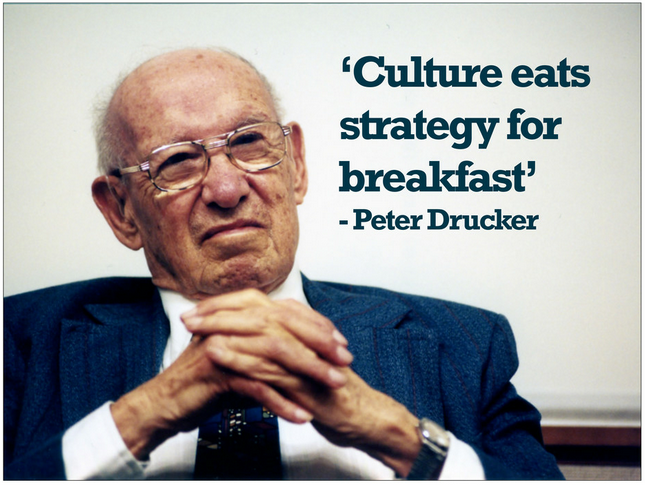
Pithy as it might be, I’ve never been a massive fan of Peter Drucker’s famous aphorism, ‘culture eats strategy for breakfast’. The intended meaning – that corporate culture outweighs strategy – sounds about right. But then, when I hear people using it, it usually gets stretched to encapsulate the rather faulty meaning that changing the strategy of an organisation is easy, whereas changing culture is almost impossible. Faulty because I’ve been witness to several situations where company cultures have quite literally been flipped overnight. All that was required was to fire the senior leadership team. Boom. Goodbye dysfunctional culture, Hello sparkly, fresh-start, new one.
The other way to instantly change culture is to give people a cause. As in, cause eats culture for breakfast. I’ve seen groups of people who really don’t get on with each well at a personal level, and I’ve seen some fairly alien and unproductive cultural traits that all became utterly irrelevant the moment everyone was aligned around a bigger issue. Like Covid-19. Or putting a man on the moon. Or shutting down a manufacture facility with dignity. Or ‘Beat Sony’, Samsung’s de facto mission statement through the years it took to achieve. The subsequent shift to ‘Beat GE’ didn’t quite work out so well, but that’s another story for another day. The point is that there’s not much to beat a meaningful cause. Simon Sinek might claim that it also needs to be an infinite cause, but, as the success of ‘Beat Sony’ suggests, it just needs to give employees the clear sense of a common enemy. Actually, thinking about it, ‘Beat Sony’ was really a proxy for ‘Beat Japan’, a rather bigger cause. Finite or infinite, though, the point is, successful organisations identify a high enough level, yet still tangible ‘enemy’-based cause to unite a critical mass of their people. I’m not sure whether that counts as a ‘first principle’, but if it’s not, it’s somewhere close.

